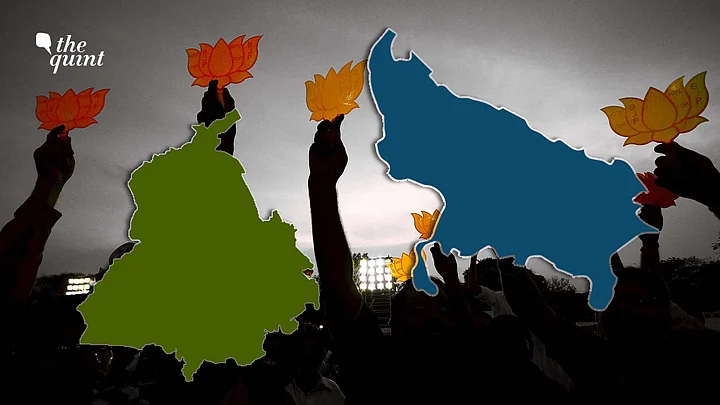Strenuous efforts by the Bharatiya Janata Party (BJP) to woo Dalit voters in the current round of state Assembly polls have seemingly hit a roadblock. In both Punjab and Uttar Pradesh, Dalits are a key factor, and the ruling party at the Centre has not met with much success in its outreach to the community, although for different reasons.
In Punjab, the vast 32 per cent Dalit community has no particular grouse against the BJP, which has played virtually no role in the Congress-ruled state over the past five years. But like most other communities in the state, Dalits see the BJP as a hopeless loser in the upcoming election, which is increasingly turning out to be a straight contest between the Congress and the Aam Aadmi Party (AAP). In fact, Dalits have been quite overwhelmed that while the Congress has appointed Charanjit Singh Channi as the first Dalit Chief Minister of Punjab, the current AAP Leader of the Opposition, Harpal Singh Cheema, is also a Dalit.
Punjab's Dalit Community Never Favoured BJP
This is the first time that Dalits, despite their large numbers, have played such a prominent role in Punjab politics. And they have largely been apathetic to the BJP. Ironically, after the ugly breakup last year with long-standing ally Shiromani Akali Dal over the controversial farm laws, the BJP, advised by their mentor, the RSS, had sought to forge an alternative alliance with Dalits, lower backward castes and urban Hindus under the Hindutva banner. It was also the first party to demand a Dalit Chief Minister in Punjab.
More recently, both the BJP and the Election Commission swiftly supported a call by Congress Chief Minister Channi for the Punjab voting to be postponed from its scheduled date of 14 February because it was too close to the annual anniversary celebrations of Dalit saint Ravidas, who has a large following in the state. But for most Dalits in Punjab, this is likely to be as inconsequential as the beleaguered Akali Dal’s desperate alliance with the Bahujan Samaj Party (BSP), which is a pale shadow of its former robust presence in the state when the party’s founder, Kanshi Ram, who hailed from there, was in his prime.
UP's Dalits are Growing Disenchanted
Unlike in Punjab, the BJP has an imposing presence in Uttar Pradesh, and there, too, the Dalit vote in the coming elections would be crucial. Ever since the Modi juggernaut gathered momentum in 2014, the BJP has made impressive gains in garnering votes from a community that had traditionally never supported the party. The party, in the 2017 state Assembly elections and even more so in the 2019 Lok Sabha polls, had not only mopped up a majority of non-Jatav Dalit votes along with those of lower backward castes but also managed to seduce a section of the BSP chief’s core vote bank of Jatavs, particularly the young, away from her as she lost the support of other communities.
However, the political narrative seems to be once again changing in Uttar Pradesh.
Although Mayawati’s stature has slipped further with her palpable lack of political belligerence recently (whether by design or disinterest), it is not the BJP that has been the gainer. Reports from the ground suggest that while older Jatavs are still fiercely loyal to the BSP, younger sections who had strayed earlier to the BJP are now leaning towards the Samajwadi Party (SP)-led alliance.
How SP Gains From the Cracks
What may be even more damaging to the BJP is that there are fissures in its newly acquired non-Jatav Dalit vote bank, along with the cracks that have appeared in the ranks of the lower backward castes. To compound matters, this loss may be a direct gain for the Samajwadi Party alliance, which is clearly the BJP’s main contender in Uttar Pradesh.
“As far as Jatavs are concerned, they will vote for the BSP if it is in a winning position in a constituency, but if not, they are likely to choose the candidate most favoured to defeat the BJP. The Pasis, who are the second-largest Dalit group after the Jatavs, voted overwhelmingly for the BJP in the past Assembly and parliamentary elections but have now done a somersault and will vote in large numbers for the Samajwadi Party alliance. There are divisions even in other smaller non-Jatav Dalit groups like the Valmikis, Dhobis and Khatiks, who have traditionally leaned towards the BJP,” said a veteran Dalit activist in the state.
Can BJP Survive the Erosion of Dalit Votes?
He said that the disenchantment and anger with the BJP among Dalits, who are among the poorest and most oppressed sections in Uttar Pradesh, stemmed mainly from severe economic distress and a series of atrocities in the past five years, most of which are against the women of the community.
“Far from protecting Dalits or looking after their economic well-being, the upper caste-dominated police and administration under Chief Minister Yogi Adityanath have been terrorising Dalits, along with other vulnerable sections like Muslims and lower backward castes,” said the Dalit activist.
The reversal of gains made by Prime Minister Narendra Modi in widening the BJP’s electoral support base to Dalits and lower backward castes could not only prove costly in the election but also damage his prospects of winning a third term in office in 2024.
(The writer is a Delhi-based senior journalist and the author of ‘Behenji: A Political Biography of Mayawati’. This is an opinion piece. The views expressed above are the author’s own. The Quint neither endorses nor is responsible for the same.)
